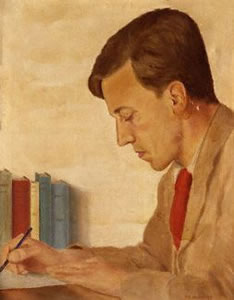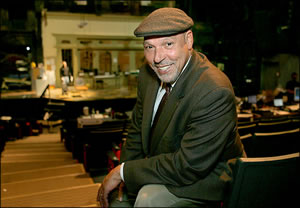De Schotse dichter en vertaler Edwin Morgan werd geboren in Glasgow op 27 april 1920. Zie ook mijn blog van 27 april 2007 en ook mijn blog van 27 april 2008 en ook mijn blog van 27 april 2009. Edward Morgen viert vandaag zijn 90e verjaardag.
At Eighty
Push the boat out, compañeros,
push the boat out, whatever the sea.
Who says we cannot guide ourselves
through the boiling reefs, black as they are,
the enemy of us all makes sure of it!
Mariners, keep good watch always
for that last passage of blue water
we have heard of and long to reach
(no matter if we cannot, no matter!)
in our eighty-year-old timbers
leaky and patched as they are but sweet
well seasoned with the scent of woods
long perished, serviceable still
in unarrested pungency
of salt and blistering sunlight. Out,
push it all out into the unknown!
Unknown is best, it beckons best,
like distant ships in mist, or bells
clanging ruthless from stormy buoys.
The Loch Ness Monster’s Song
Sssnnnwhuffffll?
Hnwhuffl hhnnwfl hnfl hfl?
Gdroblboblhobngbl gbl gl g g g g glbgl.
Drublhaflablhaflubhafgabhaflhafl fl fl –
gm grawwwww grf grawf awfgm graw gm.
Hovoplodok – doplodovok – plovodokot-doplodokosh?
Splgraw fok fok splgrafhatchgabrlgabrl fok splfok!
Zgra kra gka fok!
Grof grawff gahf?
Gombl mbl bl –
blm plm,
blm plm,
blm plm,
blp.

Edwin Morgan (Glasgow, 27 april 1920)
De Brits-Ierse dichter Cecil Day Lewis werd geboren in Ballintogher, Ierland, op 27 april 1904. Zie ook mijn blog van 27 april 2007 en ook mijn blog van 27 april 2008 en ook mijn blog van 27 april 2009.
The House Where I Was Born
An elegant, shabby, white-washed house
With a slate roof. Two rows
Of tall sash windows. Below the porch, at the foot of
The steps, my father, posed
In his pony trap and round clerical hat.
This is all the photograph shows.
No one is left alive to tell me
In which of those rooms I was born,
Or what my mother could see, looking out one April
Morning, her agony done,
Or if there were pigeons to answer my cooings
From that tree to the left of the lawn.
Elegant house, how well you speak
For the one who fathered me there,
With your sanguine face, your moody provincial charm,
And that Anglo-Irish air
Of living beyond one’s means to keep up
An era beyond repair.
Reticent house in the far Queen’s County,
How much you leave unsaid.
Not a ghost of a hint appears at your placid windows
That she, so youthfully wed,
Who bore me, would move elsewhere very soon
And in four years be dead.
I know that we left you before my seedling
Memory could root and twine
Within you. Perhaps that is why so often I gaze
At your picture, and try to divine
Through it the buried treasure, the lost life –
Reclaim what was yours, and mine.
I put up the curtains for them again
And light a fire in their grate:
I bring the young father and mother to lean above me,
Ignorant, loving, complete:
I ask the questions I never could ask them
Until it was too late.

Cecil Day Lewis (27 april 1904 – 22 mei 1972)
Portret door Frank Ernest Halliday, 1936
De Amerikaanse toneelschrijver August Wilson (eig. Frederick August Kittel) werd geboren op 27 april 1945 in Pittsbugh. Zie ook mijn blog van 27 april 2008 en ook mijn blog van 27 april 2009.
Uit: Fences
„TROY: I fooled them, Rose. I bunted. When I found you and Cory and a halfway decent job . . . I was safe. Couldn’t nothing touch me. I wasn’t gonna strike out no more. I wasn’t going back to the penitentiary. I wasn’t gonna lay in the streets with a bottle of wine. I was safe. I had me a family. A job. I wasn’t gonna get that last strike. I was on first looking for one of them boys to knock me in. To get me home.
ROSE: You should have stayed in my bed, Troy.
TROY: Then when I saw that gal . . . she firmed up my backbone. And I got to thinking that if I tried . . . I just might be able to steal second. Do you understand after eighteen years I wanted to steal second.“

August Wilson (27 april 1945 – 2 oktober 2005)
De Turkse prediker, schrijver en dichter Fethullah Gülen werd geboren in Korucuk, Erzurum, op 27 april 1941. Zie ook mijn blog van 27 april 2008 en ook mijn blog van 27 april 2009.
Dreams
When realities are too dark to endure, dawn comes in dreams.
The spirit wanders through night to find a way out
toward that which it seeks and longs for.
It travels with the hope of recovering what it lost.
When realities are too dark to endure, dawn comes in dreams.
There is a cold war between realities and imaginings.
I travel from the reason to the heart until bereft
of power to distinguish the hopeful among hopeless causes.
When events begin to drive me to give up hope.
There is a cold war between realities and imaginings.
Dreams are always vivid, full of color.
Therein man looks deep into unfathomed oceans,
beholds the past, the far future and what is near to come,
what is old and about to be replaced or renewed.
Dreams are always vivid, full of color.
In darkness man suffers the extreme of loneliness.
When everything turns pale in the dead hours of night,
when mouths are tight-lipped as if zip-fastened,
he wishes to sprout wings and fly to the realms beyond.
In darkness man suffers the extreme of loneliness.

Fethullah Gülen (Korucuk, 27 april 1941)
De Poolse schrijver Martin Gray werd geboren als Mietek Grayewski in Warschauop 27 april 1922. Zie ook mijn blog van 27 april 2009.
Uit: Der Schrei nach Leben
„So träumte ich fast jede Nacht, und der Traum ließ mich aufschrecken, ich träumte nicht mehr. Ich erinnere mich an jenen Morgen; mit offenen Augen sehe ich die Szene in der Gesia-Straße wieder: Wir alle tragen die Armbinde, es ist eine jüdische Straße. Der Lastwagen mit den Soldaten biegt ein, wahr-scheinlich fährt er zum Pawiak-Gefängnis, er durchrast die Gesia-Straße: Leute schreien, sie springen in Hauseingänge, ich ebenfalls, und der Lastwagen fegt im Zickzack die Straße leer. Später liegt an einer Mauer ein zerquetschter Mann, die Arme noch zum Schutz erhoben.
Sie hatten jetzt auch die Zwangsarbeit eingeführt, die jüdischen Schulen geschlossen; man sah Kinder mit nackten Füßen auf dem Glatteis betteln. Banden junger Polen schrien durch die Straßen: “Es lebe Polen ohne Juden!” – “Wir wollen Polen judenfrei!” Sie waren mit Stöcken bewaffnet, zertrümmerten die Scheiben jüdischer Geschäfte, schlugen Juden auf den Kopf, immer zu mehreren gegen einen.“

Martin Gray (Warschau, 27 april 1922)
Zie voor nog meer schrijvers van de 27e april ook mijn vorige blog van vandaag.
